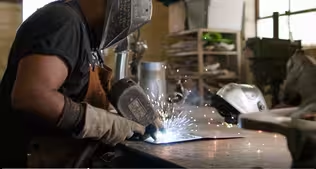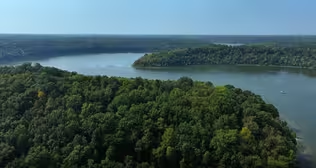
A Century of Fish Sandwiches
Clip: Season 30 Episode 9 | 7m 19sVideo has Closed Captions
Mike Linnig's, an iconic South Louisville seafood restaurant, celebrates 100 years.
Mike Linnigs, an iconic South Louisville restaurant, celebrates 100 years of fried fish sandwiches. How have three generations of the family been able to keep the business afloat? Learn how they’ve survived floods, wars and pandemics over the last century, and hear from a UofL expert on the keys for a family business to thrive.
Problems playing video? | Closed Captioning Feedback
Problems playing video? | Closed Captioning Feedback
Kentucky Life is a local public television program presented by KET
You give every Kentuckian the opportunity to explore new ideas and new worlds through KET. Visit the Kentucky Life website.

A Century of Fish Sandwiches
Clip: Season 30 Episode 9 | 7m 19sVideo has Closed Captions
Mike Linnigs, an iconic South Louisville restaurant, celebrates 100 years of fried fish sandwiches. How have three generations of the family been able to keep the business afloat? Learn how they’ve survived floods, wars and pandemics over the last century, and hear from a UofL expert on the keys for a family business to thrive.
Problems playing video? | Closed Captioning Feedback
How to Watch Kentucky Life
Kentucky Life is available to stream on pbs.org and the free PBS App, available on iPhone, Apple TV, Android TV, Android smartphones, Amazon Fire TV, Amazon Fire Tablet, Roku, Samsung Smart TV, and Vizio.
Providing Support for PBS.org
Learn Moreabout PBS online sponsorshipNow, full disclosure, I'm a very proud native of the south end of Louisville.
One of the biggest institutions in that area is marking a century of selling fish sandwiches.
Mike Linnig started as a roadside stand with fried fish back in 1924.
And through three generations of the Linnig family, it stayed a family-owned business that has remained true to its roots.
Just how tough is it to keep a family business together for 100 years?
We visited to find out and to have a few fish sandwiches as well.
[music playing] When you look at the sprawling complex that is now Mike Linnig's, it's hard to believe it started from a simple clapboard building in this very location some 100 years ago.
The land was initially a working family farm where Mike Linnig and his wife Carrie sold fruits, candy, and fresh apple cider.
In 1925, he started a little roadside stand and just started selling fish sandwiches.
Kind of people suggested selling fish.
It started out as a fruit stand.
There used to be an apple orchard down here near the river.
I remember our mom answering the phone, "Mike Linnig's Place, Mike Linnig's Place, Mike Linnig's Place."
And we were kind of unique.
So, it was a place, but now we've gotten fancy.
You know, now we're Mike Linnig's Restaurant, but we're still Mike Linnig's Place.
The Linnig family, three generations of them, called this place home.
The small, simple sandstone house right next to the restaurant is where Mike's son, Bill Sr., who became the second generation to own the business with his brother Len, raised his family.
That family included siblings Bill Linnig Jr., Nancy Wuerth, and Teresa Sissel, the third generation who now co-own the restaurant together.
Their entire lives have been built around this place.
This was home to you, right?
This was home.
Tell me about that.
Well, we lived in the stone house next door.
So, I'd get off the bus here.
I would always get off the bus here because I could come in and get a Clark Bar and a Nehi Grape, you know, and get a snack before I had to visit grandma and grandpa and get home then.
One of the few things that ever slowed down the family was wartime.
In World War II, both Bill Sr. and Len entered military service.
Gas and food rationing in that era forced the restaurant to close from 1942 to 1946.
Members of the Linnig family are still in the military to this day, and their sense of country is clear throughout the establishment.
Over the past century, Linnig's went on to become a staple of South Louisville.
As the business grew, so did the number of customers and what it takes to feed crowds as large as 2,000 people per day.
And while it may look wild, it operates efficiently.
Orders come in, paper plates get set, the items get put on, and it all slides to the counter to be delivered.
It's been done like this for decades because, as Bill says, "If it ain't broke, don't fix it."
That philosophy could be one of the big reasons why the business has flourished over the past century.
This is Vaughan Scott, director of the University of Louisville's Family Business Management Program.
He says a key factor in family businesses continuing to thrive is their ability to hang on to their history and legacy while also continuing to innovate.
I was walking with Bill earlier on the campus, and, you know, he's talking about the investments that they're gonna make in the future and the things that they're gonna upgrade and that they always find, you know, some way to reinvest every year, and that's part of the secret sauce too.
What should we hold on to that's critical and is really part of who we are, but also what do we need to do to improve over time?
But Scott also says running a family business is tough, especially one that has spanned three generations.
Between wars, fires, and floods, each generation of the Lenig family has faced a test.
For the latest generation, it was COVID.
They found themselves, like all Kentucky restaurants, where for nearly a year and three months they could not operate at 100% capacity.
Research shows close to 20% of restaurants never reopened after the pandemic.
But with a sink-or-swim attitude, the Linings' kept swimming, serving to-go orders from their parking lot.
We had some reporters come out and interview us and said, "What are you gonna do?"
And I said, "Look, we've been through fires, we've been through wars, we've been through tornadoes, we've been through floods."
This virus is not gonna get us.
And it didn't, but it got a lot of restaurants, and it wasn't easy, but we got through it.
And who would think that world geopolitics would affect the price of a fish sandwich on Cane Run Road in Louisville?
We're finally starting to make a little headway after COVID.
Russia invaded Ukraine.
And you'd say, "Well, how does that affect y'all?"
Well, it just so happens we get a lot of our cod from Russian waters, and the government put on an embargo on all the fish.
So, then you say, "Well, okay, where are we gonna get our fish from?"
Well, you can still get it from Iceland.
Well, the Icelandic guys, what do you think they're gonna do when they say, "Well, you've got to buy it from us."?
You're right.
There goes the price.
The price went crazy.
So, how do you keep it together?
How do you keep this working for 100 years?
What's the magic secret?
Well, this is our home.
I had someone tell me, "Why don't you retire and go spend the time with your grandkids and stuff?"
You know, it's like, "I hear what you're saying.
I know what you're saying."
But how are you gonna retire when this is your home?
This is your home.
You can't retire from your home.
And it's considered home to their loyal customers as well.
Not only has the Linnig family been here for generations, but so have many of their patrons as well.
One of those families there the day we visited was the Bloyds.
Bill Bloyd wanted to come there because it was his dad's favorite place.
Three hours earlier, he'd buried his dad.
And there wasn't any place else he could think of that was more perfect than Mike Linnig's.
You know, it's my dad.
Phew.
He just enjoyed it.
You know, he liked the atmosphere, and he loved cold beer.
He just enjoyed being out and in family.
This is the best way to do it.
Lots of things have to fall into place for a business based on a simple model to not only survive but thrive over 100 years.
But the common thread that's key to Mike Linnig's success is clear.
It's family.
Someone asked us before and said, "Well, how long do you think it's gonna keep going on?"
I said, "Being successful."
I said, "Well, I think we'll keep going on as long as at least one of us is willing to go back in that hot kitchen on a Friday and a Saturday and a Sunday and do that hard work."
[music playing]
Video has Closed Captions
Clip: S30 Ep9 | 6m 29s | UK sculpture professor Garry Bibbs credits his mentors with nurturing his talent. (6m 29s)
Video has Closed Captions
Clip: S30 Ep9 | 6m 20s | HollerGirl Music Festival celebrates and showcases talented female musicians of Appalachia. (6m 20s)
Video has Closed Captions
Clip: S30 Ep9 | 5m 36s | Kentucky Life travels to beautiful Taylorsville Lake State Park in Mount Eden. (5m 36s)
Providing Support for PBS.org
Learn Moreabout PBS online sponsorshipSupport for PBS provided by:
Kentucky Life is a local public television program presented by KET
You give every Kentuckian the opportunity to explore new ideas and new worlds through KET. Visit the Kentucky Life website.
















